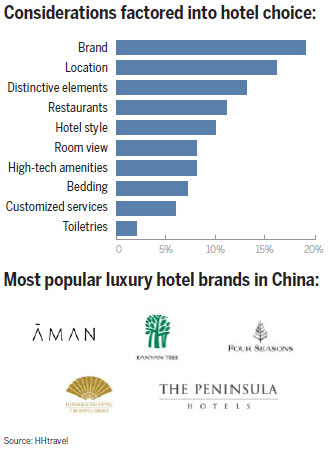
Nearly 70 percent of high-end hotel guests are from Beijing, Shanghai and Guangdong province, according to a recent report by HHtravel, the high-end branch of Ctrip.
Most guests are aged between 26 and 45.
Female guests are slightly more interested in luxury hotels than their male counterparts and have put a premium on personal needs, the report pointed out.
Nearly half of all Chinese guests at luxury hotels booked rooms for two people, while 29 percent booked for three or four people.
A hotel's brand, its location and distinctive elements are the top three factors that wealthy Chinese people consider when they choose which hotels to stay at, HHtravel's report showed.
Luxury hotel guests also value high-quality accommodations, Michelin-starred dining, local culture and special designs offered by upscale hotels, according to the travel agency.
Banyan Tree and Four Seasons are two luxury hotel brands that have grown in popularity on the mainland.
Banyan Tree stands out for its romantic and vibrant vacation ambience, while Four Seasons wins customers over with its carefully developed custom-made services and sustained innovation, the report explained.
Many top-end hotels have their own attractions for Chinese guests.
Aman Resorts' hotels are prized for their unique style, while the Mandarin Oriental Hotel Group's focus on oriental culture and the fame of the Peninsula Hotels have earned them rave reviews from guests.
According to HHtravel's user data, the Peninsula Hong Kong is popular among Chinese guests as it is the most venerable of the local hotel brands. Many have chosen the Mandarin Oriental in Hainan province's Sanya for its proximity to the beach and high-end amenities. Banyan Tree in Yunnan province's Lijiang has received positive reviews for the magnificent view it affords of Yulong (Jade Dragon) Snow Mountain.
The Anantara Xishuangbanna Resort & Spa in Yunnan's Xishuangbanna Dai Autonomous Prefecture has integrated local ethnic Dai elements with modern design, attracting many admirers.
Bookings data show that the most popular luxury hotels worldwide are those that have managed to integrate the best aspects of local cultures.
The Shangri-La Hotel Paris was built on the palace of Napoleon's grandnephew and offers two Michelin-starred restaurants. Both of these elements have helped the hotel to become one of the best and most popular of its kind in France.
Dubai's Burj al-Arab skyscraper hotel is not only a landmark, but also a dream abode for men, while the Armani Hotel Milano has made a point of showing Armani's exquisite aestheticism in its design details. Its cutting-edge sauna and various spa treatments have won the hearts of many high-end travelers.
Luxury hotels can also be found at a number of luxury resorts and private islands, and are wildly popular with both Chinese and international travelers.
The Amanjiwo resort on Indonesia's island of Java is able to book private tours of the nearby Borobudur Temple for its guests before public opening hours, giving them the chance to appreciate both the ancient wonders of the temple and the spectacular sunrise. Guests can also enjoy views of the temple from the hotel's lobby, restaurant and private pools.
One and Only Resorts' property on Hayman Island sits at the heart of the Great Barrier Reef in Australia and offers one-of-a-kind services to guests, such as the biggest irregularly-shaped pool in the Southern Hemisphere, and private seaplane and luxury yacht services to transfer visitors to the island.
Several domestic luxury hotels have been designed to cater for wealthy guests who can only spare a weekend to relax out of their hectic schedule.
These hotels blend modern design into natural landscapes, and are often set near mountains and waterways, offering oases of tranquility in an often frantic world.
The Banyan Tree Yangshuo in the Guangxi Zhuang autonomous region features local ancient architecture design and offers special dishes from the region and Guangdong province, while the Amanfayun resort in Zhejiang province's Hangzhou is tucked away in mountain valleys to the west of the renowned West Lake and integrates strong Buddhist elements into its overall flavor.